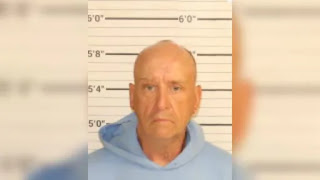Sometime this year, the Birmingham police received
multiple complaints from art collectors alleging that Beard had taken
their artwork on consignment and had not returned the art after the
contract had ended.
Birmingham police referred the complaints to the FBI.
Dozens more victims came forward, including five
individuals whose stories were shared in an FBI affidavit on file in
federal court.
But as the FBI agent noted in
the affidavit: "Bank records and other business records indicate there
are likely to be more victims who have yet to be interviewed."
Victim No. 1
In
2018, an 82-year-old art collector gave Beard about $900,000 worth of
fine art photography to sell on consignment. Among the prints was a
mural-sized photo by Ansel Adams titled "The Tetons and the Snake River,
Grand Teton National Park, 1942."
Beard had appraised the photo's value at $625,000,
and brokered a nine-month agreement with its owner to list it for
$685,000 – with a 5% commission going to Beard as the consignee. The
agreement expired in December 2019.
On Nov. 14,
2019, Beard sent an email to her client and stated that she took the
photo to Jackson, Wyoming, in attempts to sell it, but was not
successful. She then asked the owner if they would consider taking
$440,000 for the photograph.
But unbeknownst to the owner, Beard would eventually sell the photo for
$440,000 to the Wyoming gallery, ship it from her Franklin home to a
private collector, who then wired $440,000 to a bank account belonging
to the Wendy Halsted Gallery. The signers on the account are Beard and
her husband.
The Ansel Adams print would then be sold over and
over again, for more and more money. It recently resold for $685,000 to a
private client, who displayed it in a private residence in Idaho.
Meanwhile,
the original owner of the photo got nothing, the FBI says, and was
never notified by Beard what happened to the photo.
The lung transplant story
The
FBI says Victim 1 made multiple attempts to get their photos back from
Beard, but that Beard came up with multiple excuses, most of them
alleging she was in poor health and struggling with lung issues that put
her on a transplant list.
On Aug. 3, 2021,
Victim 1 received an email from a "Wendy" at the gallery, citing an
unplanned hospital stay by Beard. In the email signed "Wendy," Beard
claimed to have been unconscious for an extended period of time but "got
bumped up on the transplant list."
Victim 1 received similar emails from other email addresses, claiming to be Beard's assistants.
According
to the FBI, the email addresses that these messages were coming from
were created in 2021 and registered to Beard's personal cell phone
number. The names tied to the addresses had no connection to the Wendy
Halsted Gallery.
"Nor does there appear to be any payroll paid out to anyone via the
Wendy Halsted Gallery bank accounts reviewed by the FBI," an FBI agent
wrote in an affidavit, adding there were more victims who had been
scammed by Beard, and they were getting the same types of emails as
Victim 1.
"I believe Beard created these and other
fictitious assistants and email addresses in furtherance of the fraud
and to create sympathy from her victims and justify why she had not
returned their artwork," the FBI agent writes, pointing to statements
that claimed Beard was in the hospital or in a coma.
As
for the lung transplant story, the agent added: "According to the
United Network for Organ Sharing (UNOS), there is no record of Beard
ever being on a transplant list or the recipient of a donor organ."
Victim No. 2: A man with Alzheimer's
In
May, Birmingham police received a report from a person alleging their
89-year-old father with Alzheimer's had been scammed by the owner of the
Halsted Gallery.
According to the relative, in
2020, their father gave Beard five photographs by Ansel Adams, Ion
Zupco, Arnold Newman and Jerry Uelsma to sell on consignment. But the
relative was not pleased with the progress Beard was making and
requested to end the consignment agreement.
However, prior to returning the photographs, court records state, Beard dropped the photographs off at a local framing business.
When
the relative received the photographs back, they noticed that one
image, a signed photograph by Ansel Adams titled "Tenaya Creek," was now
missing the artist's signature. Further, a second image purporting to
be a signed photograph by Ansel Adams titled "Siesta Lake Portfolio" was
actually a different Ansel Adams photo known as "Moon and Half Dome."
When Victim 2's relative contacted Beard to get
the correct photos returned, Beard was evasive, court records state. So
on the morning of May 24, police went to Beard's home, where Beard
agreed to return the two missing Ansel Adams photos.
But when the detective unwrapped the packages, the wrong photographs were inside.
Almost
two weeks later, Beard showed up at the Birmingham Police Department
with two photographs. One was the correct "Siesta Lake" photograph. But
the second photo was still the wrong one.
The signed "Tenaya Creek," valued at $4,000-$5,000, was still missing.
Victim No. 3: A Pulitzer Prize winner
In
2020, a 69-year-old Pulitzer Prize winning photojournalist and college
professor emailed the Halsted Gallery to sell some rare original
photographs. The photographer signed a deal for Beard to sell 20
photographs on consignment for a lump sum of $40,000. Beard would get a
10% commission and the agreement would expire after a year.
Within six months, the photographer said Beard
became evasive. The photographer contacted a gallery in Florida where
the photos were supposed to be on display, and was provided contact
information for Beard's assistant, a so-called "Katy Welsh."
In
May 2021, 18 months after the agreement had expired, Victim 3 lost all
of his life's work and art collection in a residential fire. The
photographer subsequently tried to contact Beard but was unable to reach
her.
To date, the FBI says, Victim 3 has never
been paid for any of the photographs on consignment with Beard, nor has
she ever returned them.
Numerous victims
interviewed by the FBI said that Beard had planned to take their artwork
to her gallery in Florida to sell. In 2021, Beard leased space in Palm
Beach Art showroom for seven months, but left an inventory of 62
photographs after her lease ended.
Victim #4 got a backdated check from a closed account
In
early 2019, a 70-year-old art collector placed four items on
consignment with Beard: a signed Ansel Adams book and three photographs.
A few years passed and the items didn't sell. So Victim 4 requested that everything be returned.
On
Aug. 4, a UPS package arrived. It contained the signed Ansel Adams book
and a backdated check for $4,000. It was dated Nov. 9, 2021. The memo
on the check stated "Edward Weston," which Victim 4 concluded was for
the sale of an Edward Weston photograph, even though Beard had never
informed the victim of that sale.
Victim 4 contacted the bank, which disclosed Beard's account had been closed, and therefore the check was could not be cashed.
Beard claimed she would return the other two photographs, the affidavit states, though Victim 4 has yet to receive them.
Meanwhile, the FBI investigation would reveal that
Beard had shipped one of Victim 4's still-missing photographs to an art
dealer in Los Angeles. That dealer acknowledged selling one of the
missing photos to a private collector – and paid Beard $7,875 for it in
2021.
The Los Angeles dealer could not find a buyer for the other photograph and shipped it back to Beard at her home in Franklin.
Victim No 5: A longtime friend of Beard
In
July 2021, Beard contacted a 72-year-old longtime friend and asked if
the friend was interested in buying an Ansel Adams photograph titled
"Moonrise Hernandez" for $73,000.
The friend paid Beard for the photo in two payments: $40,000 and $33,000 in the form of personal checks.
As
time passed, Victim 5 tried to contact Beard about the photograph, but
Beard was evasive and gave various medical reasons for why she had not
shipped the photo yet, including sending this email on Sept. 1:
"On
computer finally. Been a crazy last bit .... Not all gone but at least
out of the months long coma. Nice to see the sunshine sorry so short
more later. "
According to the FBI, this would have been the second medical coma Beard experienced within a year.
Meanwhile,
just two weeks prior to Beard sending that email, the FBI saw her leave
her residence and drive to a Detroit parking structure.
According to the FBI: "Beard did not appear to be physically impaired."



















